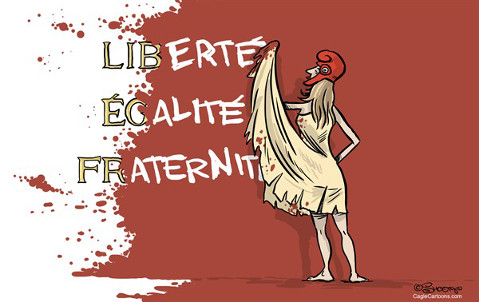A Report from Paris
Terrorist Attacks Occur on the Verge of UN Climate Conference

Two days after the murderous and unfathomable terrorist attacks in Paris on Friday, November 13, the City of Light remains empty, except for those who want to show that they are alive and intend to continue living their lives as normally as possible.
Radio stations ceaselessly discuss the killings, first to recount the chronology of events and then to try to understand the incomprehensible and share intense feelings. What is shocking is the apparent randomness of the shootings within Paris, although everyone now agrees that what appeared random was not.
It is not only a breach of the peace, as such attacks are, but more importantly a strike against a certain lifestyle — dining and drinking on the terrace of a café on a Friday night with friends, attending a soccer game or a concert with thousands of supporters — the lifestyles of young people of different social and ethnic origins, the lifestyle of anyone who enjoys living, socializing, or being entertained through sport or music.
It is an attempt to separate and create a breach between the French people through their reactions to the events. A breach between those who want to respond aggressively — following French President François Hollande, who labels those attacks as acts of war and who will be exploring energetic means of reprisals — and those who want to show that they stand together, unafraid to continue their lives.
The fear among intellectuals, politicians, and many citizens is that the limitation of citizen rights from the state of emergency, the calls for expulsion of fundamentalist imams, and the administrative detention of radical Islamists on French soil, as Prime Minister Manuel Valls suggested on television, will further amplify the societal division wanted by ISIS. On the other hand, there is a strong sense of needing and wanting to stand up to the attacks and maintain a spirit of solidarity built on the republican values of liberty, equality, and fraternity. And fraternity was demonstrated on Friday when inhabitants of the Paris neighborhoods under attack (the 10th and 11th Arrondissements) opened their doors to those fleeing the carnage and those unable to go home for lack of public transportation, and when taxi drivers decided to offer free rides.
It is this fraternity and unity that will be needed from all the nations attending COP21, the 21st annual United Nations Climate Change Conference being held from November 30 to December 11 in Paris. Will unity come from the delegates representing and negotiating for their countries? Nothing is more unsure. The positioning that existed a few days ago before the attacks will remain, with countries such as the U.S. already warning that they will not sign any legally binding agreement and developing nations dissatisfied with the pathetic offers made for the Green Climate Fund, totaling about $10 billion, a very small step toward the $100 billion needed for the global initiative to prevent the Earth’s temperature from rising over 2°C.
World unity will more likely come from all those of civil society who will be gathering at the conference and in Paris. How these planned demonstrations of unity will be affected by the recent events is unclear at this time.
First of all, President Hollande announced that COP21 will be maintained under major police protection. Plans that were already in place to reinstate French border controls ahead of the conference will be beefed up. How will the thousands of people converging in Paris be able to express their dissatisfaction with the negotiations, if such dissatisfaction emerges? Will the ability to demonstrate as a group and voice strong feelings of discontent with a global agreement be another casualty of these attacks?
Catherine Gautier-Downes is a professor emeritus of geography at UCSB. She was in Paris in advance of the upcoming United Nations summit on climate change, COP 21 — which she will report on for The Santa Barbara Independent — at the time of the attacks.



